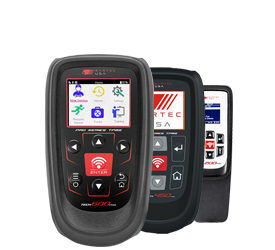Ford TPMS Sensor Replacement
If a sensor proves faulty or is damaged then it will need to be replaced. This requires a new sensor to be fitted and the ECU to be reprogrammed with its unique ID and its position on the vehicle. The procedures for all vehicles are illustrated in the Bartec Mitchell1 'Tire Pressure Monitoring Systems Guide' which shows service requirements, reset procedures, dismounting/mounting instructions, torque specifications etc for all Ford models and years.
The technician should always: refer to manufacturer's specifications for proper torque requirements when replacing nuts and valve cores; use new grommets, nuts, plastic or nickel-plated valve caps and electro-less, nickel-plated valve cores when performing any tire service; never use a brass valve core or un-plated brass cap with an aluminum TPMS sensor stem. Contact between dissimilar metals can cause galvanic corrosion, which can lead to loss of air pressure.
Note: The technician should avoid the use of any liquid or tire sealant injected into tires equipped with TPMS as this may block the pressure port and cause malfunction. If evidence of the use of tire sealant is noted upon dismounting the tire, it is highly recommended that the TPMS are replaced. It is also very important to remove all residual sealant from the inside of the tire and rim surfaces prior to re-installing the tire to the Ford vehicle.

The Ford range of cars unlike most vehicles made in North America do not have an inbuilt relearn mode to enable the vehicles to relearn the TPMS ID's when a TPMS repair tool is used to activate the sensor. It is important therefore to have access to a Bartec Wheelrite TECH400 tool which is able to diagnose Ford TPMS issues and also has an extra interface to the vehicle OBDII/CANbus to communicate with the vehicle Engine Control Unit (ECU) and download the TPMS data. The Wheelrite TECH400 has this feature.
The tool can display the Service kit number and the replacement part number for the TPMS sensor to ensure the correct part is fitted. It can program the car and also turn off the TPMS warning light!
Finally when the TPMS replacement procedure is complete it is good practice to do a final audit and print the results out for the customer. This completes the circle for your liability protection (showing the job has been completed professionally) and affirms your technical reputation with the customer.
Please browse our website for more information about Bartec USA LLC and our range of Ford TPMS Tools and our professional Ford Tire Pressure Monitoring System support, then toll free 855 877 9732 and speak to one of our team or e-mail us at sales@bartecusa.com.
 Bartec USA LLC
Bartec USA LLC